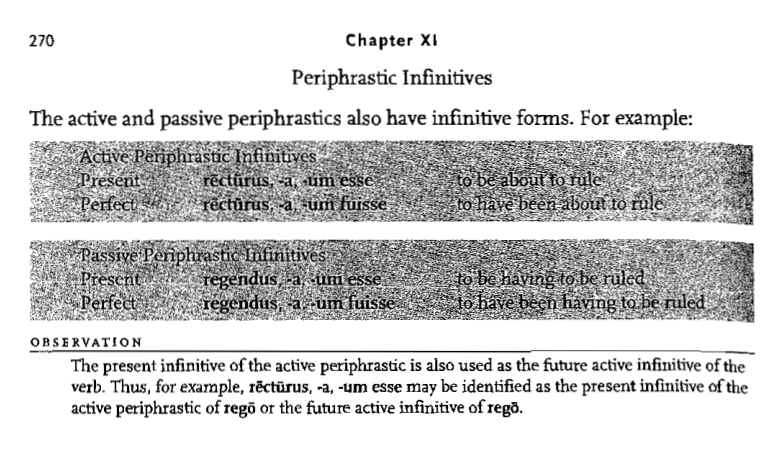Basically, yes. But that terminology is highly confusing, in my opinion.
In the terminology I'm used to, the periphrastic future goes like recturus sum, "I will rule". Its infinitival form is obviously recturus esse. It is only active, there is no passive.
The normal future is regam. Latin has no real future infinitive, so the infinitive from the periphrastic future is used, recturus esse.
This should be little surprise, because the periphrastic future is often used with the same meaning as the normal future; it can substituted for a normal future when a subjunctive is required, which the normal future does not have, or when there is some other reason why the normal future cannot be used, e.g. Oedipus natus est Iocasta, quam postea nupturus erat: "Oedipus was born to Jocasta, whom he would later wed". It is true that the participle recturus can have a specific shade of meaning, like about to rule; but in the periphrastic construction, as often as not, it has no specific meaning other than future.
The normal future can be made passive without problem, regar. But the periphrastic future cannot, because neither the future participle recturus nor the verb esse have passive forms. And this is very rarely 'needed' anyway: it would be very rare if it existed.
There is, however, some need for a passive future infinitive, because the normal future has no passive infinitive. So a special, passive kind of periphrastic future infinitive is normally used: rectum iri. Perhaps this iri may be from eo "go", which normally doesn't have any passive infinitive, but I don't know about that.
Rectum is the first supine: it does not agree with anything, it is always this form. So dicit reginam necatum iri: he says that the queen will be killed. Regina dicitur necatum iri: it is said that the queen will be killed.
Regendus is a gerundive. It is a passive verbal form, and it is somewhat like a participle in meaning, which is why I have occasionally heard it described as the future passive participle: but that is not its normal name, and its meaning is more specific than indicating mere future. It has strong modal connotations of obligation or weak possibility: "which must be ruled" or "which can be ruled", not "which will be ruled".
In some contexts, this difference in meaning is slight or zero, which is why you could possibly use regendus esse for a kind of passive future infinitive, sometimes. It would then of course be called periphrastic, because it is composed of two words 'circumscribing' and supplanting a form that doesn't actually exist (the future passive infinitive).
